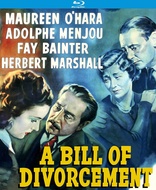A Bill of Divorcement Blu-ray Movie
HomeA Bill of Divorcement Blu-ray Movie 
Never to LoveKino Lorber | 1940 | 75 min | Not rated | Feb 26, 2019
Movie rating
7 | / 10 |
Blu-ray rating
| Users | 0.0 | |
| Reviewer | 3.0 | |
| Overall | 3.0 |
Overview
A Bill of Divorcement (1940)
Father's return from the insane asylum spells calamity for the Fairfield family.
Starring: Maureen O'Hara, Adolphe Menjou, Fay Bainter, Herbert Marshall (I), Dame May WhittyDirector: John Farrow
| Drama | 100% |
Specifications
Video
Video codec: MPEG-4 AVC
Video resolution: 1080p
Aspect ratio: 1.36:1
Original aspect ratio: 1.37:1
Audio
English: DTS-HD Master Audio 2.0
Subtitles
None
Discs
Blu-ray Disc
Single disc (1 BD)
Playback
Region A (B, C untested)
Review
Rating summary
| Movie | 3.0 | |
| Video | 4.0 | |
| Audio | 3.5 | |
| Extras | 0.0 | |
| Overall | 3.0 |
A Bill of Divorcement Blu-ray Movie Review
Reviewed by Jeffrey Kauffman February 18, 2019It can typically take several years for Hollywood to even consider doing a remake of a film, for any number of easily discernable reasons, including but not limited to the fact that if enough time hasn’t passed, folks may simply feel the earlier version is being recycled rather than something new being offered. That’s perhaps one reason why it’s at least a little odd that A Bill of Divorcement got not one but two remakes within less than two decades from the first appearance of the tale in a 1922 British silent, though the very fact that the first film version was a British silent may logically account for at least some of the remake "whirlwind". (The original British film was in turn based on a play which had debuted in the previous year of 1921, and all three versions are decidedly "stagebound" in presentational aspects.) Perhaps because the first film was British (and a silent), it may not have made enough of an impact to seriously hamper the first talkie version of the film, which appeared ten years later in 1932, and which rather famously (at the time, at least) paired Katharine Hepburn (in her screen debut) with John Barrymore. If there was no real "market based" exigencies preventing the 1932 "remake" (in quotes since the original British version may not have had a ton of impact stateside), there's arguably a bit more of a surprise factor in that the next version came out a relatively short while after the Barrymore/Hepburn version. Perhaps because that version made a bit of a splash at the time of its release, it may strike some as at least a little unexpected that the next version showed up only a mere eight years later, in 1940, with Maureen O’Hara taking over the part of Sydney, the daughter of a man named Hilary (Adolphe Menjou in the Barrymore role), whom Sydney has never really known since Hilary has been locked away in an insane asylum for many years.
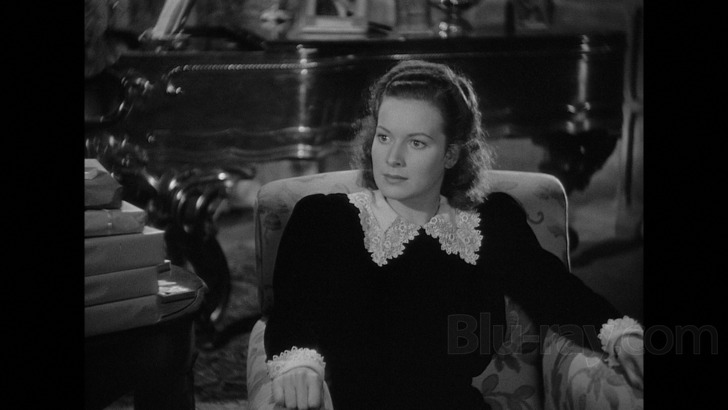
A Bill of Divorcement is certainly a product of its time, as may be gleaned from its very title. (This title may remind some of how the production standards at the time wouldn’t allow the Cole Porter musical The Gay Divorce to be filmed under that name, since it was thought divorces couldn’t be happy, leading to the film being called The Gay Divorcee when it came out in 1934.) Apparently back in the “Dark Ages” of the early 20th century, one of the few surefire ways for a woman to be able to divorce her husband was if he had been deemed insane. That’s a salient plot point in A Bill of Divorcement, for as the film begins Sydney’s mother Margaret (Fay Bainter) is attempting to put the sadness of her life with Hilary behind her by pursuing a relationship with Gray Meredith (Herbert Marshall). Sydney is also involved with a dashing young man named John Storm (Patric Knowles).
A Bill of Divorcement is undeniably old school in its florid, often kind of almost hyperbolic, dialogue, but it at least hints at some surprisingly provocative subject matter. When Hilary (Adolphe Menjou) shows up unexpectedly, his presence of course throws the entire household into turmoil, but what's interesting about this is that the household has already been shown to harbor tensions simmering just beneath the surface. It's hinted at rather broadly that Sydney may have inherited her father's "eccentric" streak, and it's kind of fun to see firebrand Maureen O'Hara erupt into little fits of pique in this role. She's somewhat less patrician seeming than Katharine Hepburn, but perhaps for that very reason she is arguably a little more vulnerable appearing.
But by any stretch A Bill of Divorcement is very odd indeed. It attempts to give a kind of melodramatic, soap operatic, account of a family in crisis, but the denouement, featuring the two arguable nutcase members of the family pounding away in tandem on a piano is just a patently bizarre formulation for an era of film that often tended to focus on the guy getting the girl before the final fade. Now, that’s admittedly what kinda sorta happens here, but when it’s a father and daughter, things might be provocative in a way that slipped right passed the Hays Office.
A Bill of Divorcement Blu-ray Movie, Video Quality 
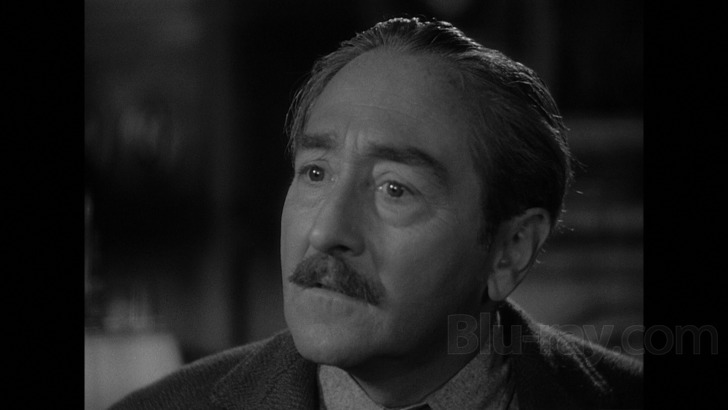
A Bill of Divorcement is presented on Blu-ray courtesy of Kino Lorber's Studio Classics imprint with an AVC encoded 1080p transfer in 1.36:1. The back cover of this release touts a "brand new 2K master", and aside from a few passing issues this is a nicely organic and problem free transfer. There's one kind of odd moment early on during the credits, where there's a momentary superimposition during an optical dissolve (see screenshot 14), and it's frankly been so long since I've seen this version (I think maybe it was even on American Movie Classics, that's how long ago it was), I just can't recall if it's always been there. There are a few minor speckles and pieces of dirt that dot the premises, but nothing that's very distracting. Contrast is excellent throughout the presentation, and the grain field resolves naturally as well. There are several optical dissolves within the film itself, some of which can look momentarily rough. Detail levels are routinely excellent, though a couple of medium and close-up shots look like they have inherent minor focus pulling problems.
A Bill of Divorcement Blu-ray Movie, Audio Quality 
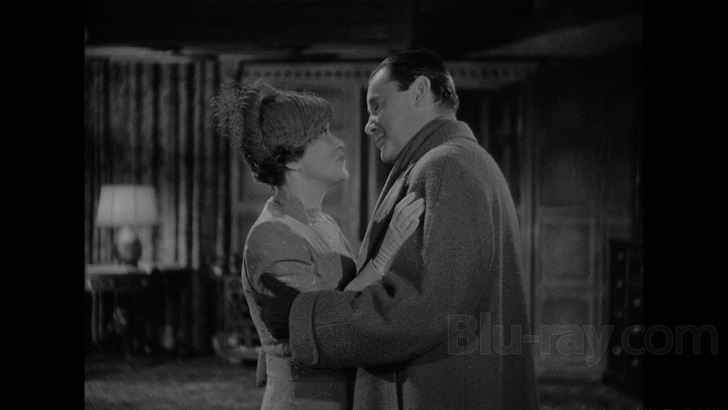
A Bill of Divorcement features a competent DTS-HD Master Audio 2.0 mono track that exhibits a bit of boxiness throughout, but which supports the film's dialogue perfectly well. Some of the Roy Webb score sounded a bit bright to my ears, but there are no outright problems with major distortion. The disc does not contain subtitles.
A Bill of Divorcement Blu-ray Movie, Special Features and Extras 
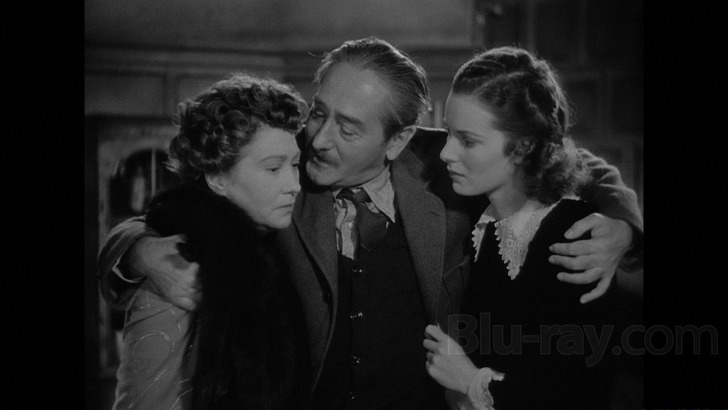
The only "supplements" on this disc are trailers for other Kino Lorber releases (not even this particular one).
A Bill of Divorcement Blu-ray Movie, Overall Score and Recommendation 
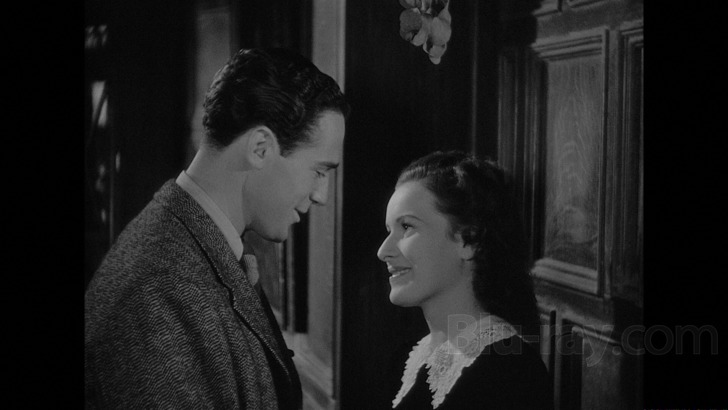
Trivia hounds may be interested to see this version was directed by John Farrow, husband of another Maureen (Sullivan), and father to Mia. Farrow brings the kind of well heeled professionalism you'd expect, and the film tries to develop some emotional momentum, but my hunch is this material probably played as old fashioned even in 1940. Fans of the cast may well want to check this out, and the good news for them is that technical merits on this disc are generally solid.
Similar titles
Similar titles you might also like

Pittsburgh
1942

A Delicate Balance
1973

American Madness
1932

Brideshead Revisited
30th Anniversary Edition
1981

Cavalcade
80th Anniversary / Fox Studio Classics
1933

Sophie's Choice
Collector's Edition
1982

Sherlock Holmes
1922

Shadows and Lies
Shadows & Lies
2010

The Other Man
2009

You Never Know Women
1926

Touchy Feely
2013

The Private Lives of Pippa Lee
2009

The Lost City
2005

Personal Effects
2009

Manhandled
1924

The Big Parade
Warner Archive Collection
1925

Flashbacks of a Fool
2008

Norma Rae
35th Anniversary Edition
1979

Salome
1953

The Sound and the Fury
Limited Edition to 3000 - SOLD OUT
1959
